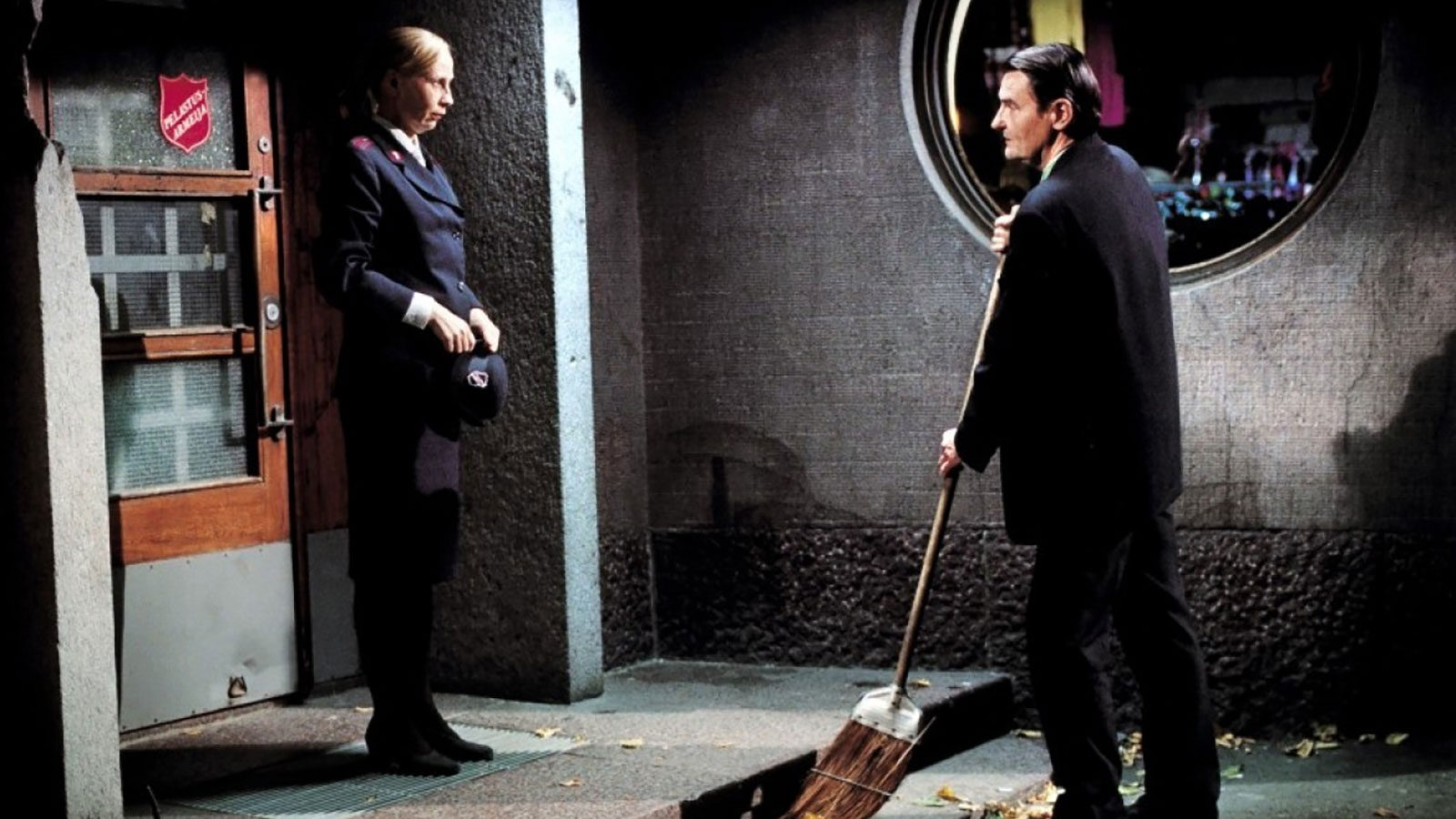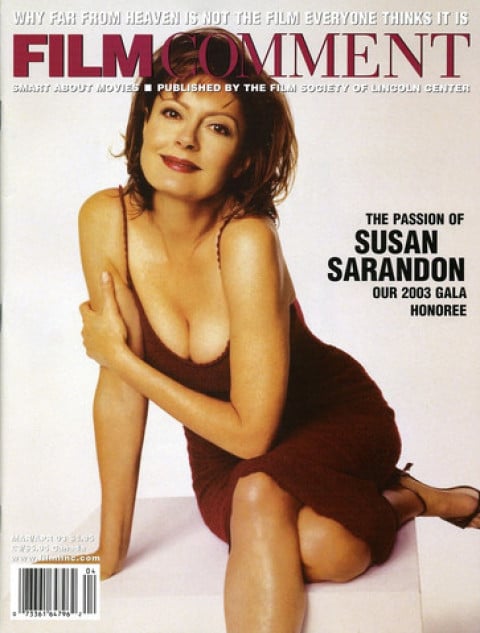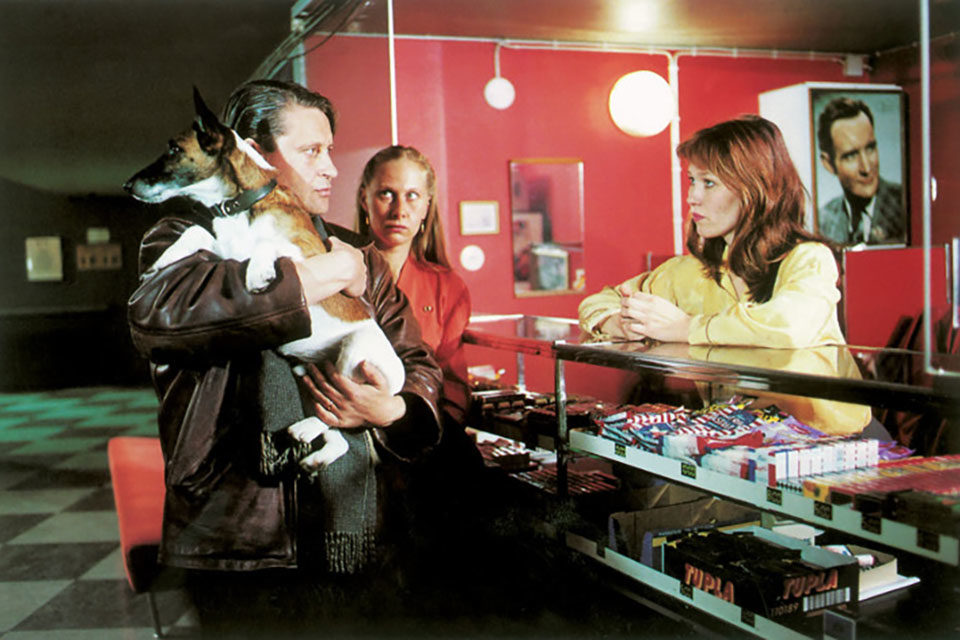
Last Exit to Finland
My favorite English subtitle comes in Aki Kaurismäki’s Take Care of Your Scarf, Tatjana. As its two middle-aged slackers awkwardly sit down together, one tells the other, “Move your ass, said Johnny Cash.” The more literal translation, “Get up smartly, sang Anniki Tahti,” refers to a veteran Finnish chanteuse who has a memorable cameo in Kaurismäki’s latest film, The Man Without a Past. But the Jonnny Cash reference is inspired, not just for its note of barroom swagger, but also because it pinpoints the flavor of Kaurismäki’s films. There’s actually almost no country music to be found amidst his eclectic soundtracks, which in their way provide as thorough a self-portrait as Scorsese’s jukebox choices: blues, lachrymose Finnish tango, snatches of Shostakovich and Tchaikovsky, and copious Fifties and Sixties rock and R&B.

But Kaurismäki doesn’t need country music, because his films are themselves country and western songs of the old school: stories of taciturn loners with hidden sentimental streaks, trying to walk tall in a world where there’s not enough work and too much vodka. Kaurismäki has taken the road movie genre more to heart than any European director save Wenders; it seems an oversight that he’s never made a film about a lonesome trucker winning the heart of a diner waitress on the highway north to Lapland.
Following the universal praise for The Man Without a Past in Cannes last year—for many critics, it should have won the Palme d’Or—there is no longer any excuse for not taking Aki Kamismaki seriously, although he himself has spent his career dismissing himself as a buffoon. A master of the sourly self-deprecating interview (“All my films are lousy”), he spikes his most deeply felt scenes with flip gags that undercut the emotion: at one of the gravest moments in Drifting Clouds, as the unemployed hero’s hoped-for job falls flat, he falls flat too, keeling over like a plank in true slapstick style.

Drifting Clouds (Aki Kaurismäki, 1996)
The clowning seems a defense mechanism on the part of someone who takes film and life seriously—at times, you suspect, painfully so. Kaurismäki’s cinephilia, together with his hangdog persona, suggests that he really does make films to stay alive: at the very least, they offer a healthy distraction from his prodigious intake of alcohol and tobacco. Kaurismäki has devoured the American noir tradition, but his professed allegiance is to the European high canon: his recent selection of an all-time Top Ten for Sight & Sound included films by Vigo, Buñuel, Bresson, and Tati, along with Griffith and Ozu. He started filming in the early Eighties, co-directing a rock documentary, The Saimaa Gesture, with his globe-trotting brother Mika (whose own directing career remains entirely overshadowed by his older brother’s); the two launched careers that briefly ran in tandem, working as each other’s producers and presiding over the congenially offbeat Midnight Sun Film Festival, way up in the Arctic Circle.
Kaurismäki’s films may offer a wayward variety, yet his working methods are remarkably constant: he chooses his lead actors from the same pool of haggardly characterful faces and has always worked, except in one TV film, with the virtuoso cinematographer Timo Salminen. According to Kaurismäki, he himself chooses the compositions and gives Salminen free rein with lighting. You can usually tell a Kaurismäki film by a single shot—especially the slightly stiff two-shots in cafés, or slouched groups at bar tables. And despite Salminen’s versatility—equally at home with outdoor naturalism and with sculpted black-and-white chiaroscuro—certain signature looks recur, notably the hot cartoon-strip primaries of The Man Without a Past and the deep chalky blue that dominates Drifting Clouds.

La Vie de Bohème (Aki Kaurismäki, 1991)
Significantly, the opening shot in Kaurismäki’s first fiction feature is a close-up of a beetle squashed on a butcher’s slab: how’s that for an opening statement on the human condition? Kaurismäki’s adaptation of Dostoyevsky’s Crime and Punishment (83) is his one genuinely nihilistic film—the Raskolnikov figure kills a businessman for reasons that remain obscure, presumably because Kaurismäki himself neither knows nor cares. The film offers a slightly studious homage to Bresson, including a replay of the through-the-grille finale of Pickpocket, but this is Bresson stripped of redemption; the anti-hero glumly concludes, “I killed a louse and became one myself. The number of lice remained constant.”
A jollier hymn to futility was the black-and-white Calamari Union (85), in which 17 outsiders all named Frank undertake a mock-heroic odyssey across Helsinki. Kaurismäki’s most Nouvelle Vague-ish film—using Helsinki as a gameboard much like the Paris of Breathless—it’s also an unreconstructed guys’ movie, full of preposterous rock-rebel poses and somewhat brusque misogyny. The same spirit persists, in a lighter, Tati-like mode, in Leningrad Cowboys Go America (89), a road comedy starring the eponymous novelty band, a supposedly Siberian combo with foot-long quiffs; a little of their shambolic cod-Russian rock goes a long way, as witness Kaurismäki’s serviceable 1993 concert movie Total Balalaika Show. If the first Cowboys film is an object lesson in stretching one gag nearly to the breaking point, the 1994 Leningrad Cowboys Meet Moses is a painfully unfunny schlep: Go America is the boozy road trip; Moses is the crashing hangover.
In some films, Kaurismäki seems to be settling scores with texts or genres that peeve him. The black comedy Hamlet Goes Business (87) turns Elsinore into the HQ of a rubber duck manufacturer, and Laertes is killed by a radio jammed onto his head. Hamlet presents itself as a caustic bad joke, yet the severity of the nocturnal atmosphere is intensely memorable. In the English-language I Hired a Contract Killer (90), forbiddingly bleak for all its absurdity, a solitary French exile in London (a dazed Jean-Pierre Léaud) hires a dying hitman to kill him. Although the film is dedicated to the memory of Michael Powell, its London, populated by shabby gangsters and ancient cabbies, owes most to creaky British thrillers such as The Blue Lamp. Kaurismäki’s phantom London is a patchwork Nowhere, a hellhole redeemed only by the chance that you might stumble on Serge Reggiani running a hamburger stand or Joe Strummer playing solo in your local pub.
By contrast, the exiles’ Paris in La Vie de Bohème (91)—an update of the 1851 novel that inspired Puccini’s La Bohème—is practically a utopia. Again, there is the sense of a private joke spinning itself out for too long—not least in the throwaway cameos by Léaud, Louis Malle, and Sam Fuller. Yet the cultivated anachronism and weary melancholia for once offer unironic access to Kaurismäki the tender nostalgist, offering up a devotional hymn to a lost homeland of French cinema; and Salminen’s glowing chiaroscuro city is often sublime.
The most consistent strand of Kaurismäki’s work is his series on blue-collar Finnish life, of which The Man Without a Past is the latest episode. Shadows in Paradise (86) stars Kaurismäki’s acteur-fétiche, the late Matti Pellonpää, a gimlet-eyed, walrus-whiskered member of the same mutant branch of the heron family as Jean-Pierre Léaud. Pellonpää, a brilliantly farouche joker, also excelled as an unlikely romantic lead, especially opposite Kaurismäki’s equally improbable diva, the poker-faced Kati Outinen. Shadows in Paradise recounts a seemingly hopeless romance between a garbage collector and a supermarket cashier, ending optimistically as they sail to Estonia, a frequent haven in Kaurismäki films. A similar flight to better things ends Ariel (88), in which a miner fallen on tough times is raised up by the love of a hard-grafting woman—variously slaughterhouse worker, hospital cleaner, traffic warden, and bank guard. Kaurismäki at once has a conservative’s respect for honest toil and a slacker’s innate dread of it, as if any kind of work (other than filmmaking) is bound to entail grief.
Witness The Match Factory Girl (90), the only Kaurismäki film that you couldn’t classify, even at a stretch, as a comedy. Pregnant and abandoned, Outinen’s gauche heroine kills her seducer with rat poison, and then, warming to her forte, also murders her exploitative parents and a random drinker. As the title’s echo of “The Little Match Girl” suggests, this is a pessimistic fairy tale, and rigorously concise—Kaurismäki’s own Mouchette.

The Match Factory Girl (Aki Kaurismäki, 1990)
In the Nineties, Kaurismäki’s frenzied rate of production fell off, but the sporadic one-offs were often inspired. Take Care of Your Scarf, Tatjana (94) is a near-perfect 65-minute vignette—a Sixties road comedy about two taciturn middle-aged rockers in a vintage American car who give two Soviet women a lift to the Tallinn ferry. The men are reduced to terrified silence by their presence, leading to scenes of romance conspicuously not blossoming in starkly lit hotel rooms and canteens. The film is the perfect compendium of Kaurismäki tropes: vintage homegrown rock ‘n’ roll, gloomily faded interiors, an edge of gruff sentiment for nature, and telegraphically bizarre dialogue about the rigors of being a rocker.
Despite taking place in a fantasy past—a dream of Kerouac gone Nordic—Tatjana is revealing about Finnish culture, about the thirst for Americana on the one hand and the fascination with the neighboring former USSR on the other. There are lovely allusions to Soviet cinema, the characters sitting peeling potatoes in a vision of socialist-realist pastoral, while the Russian woman Klavdia waxes lyrical about her collective farm’s record crop.
Tatjana is Kaurismäki’s most eloquent statement about men and women, a tender far cry from the former autistic machismo. The two traveling duos are perfectly matched as Laurel and Hardy partnerships: skinny Reino (Pellonpää) with Valto (Mato Valtonen), a caffeine-addicted man-mountain; and Outinen’s Tatjana with Kyrsi Tykkyläinen, a chunky queen of mocking slyness. When Tatjana finally puts her head on Reino’s shoulder, the improbable coyness of these overgrown children makes for an entirely un-artful re-creation of cinematic innocence, a theme for which Kaurismäki evinces a deep nostalgia; only a pair of elongated sourpuss faces like Outinen and Pellonpää could have made it work.
The tone of 1996’s Drifting Clouds is best summed up by its line, “Life is short and miserable. Be merry while you can.” Restaurant manager Ilona (Outinen) loses her job when her old-established eatery comes under new management. Her bus driver husband (Kari Väänänen) loses his too, and briefly yields to drink and despair. Behind this tragedy is another one never referred to in words: the death of a child, first hinted at by a smiling portrait on a shelf; in a poignant touch, the credits reveal it to be a childhood shot of Pellonpää, who had recently died.
Redemption finally comes in telegraphic touches: when the couple open a new restaurant, we know it will succeed because the first customer scans the menu and gives his dining partner a brisk thumbs-up. The very next moment, Ilona is calmly taking a reservation for 30 from the Helsinki Workers’ Wrestlers. The ending soars because it’s so perfectly undemonstrative: the couple simply step outside, holding their terrier (one of several cameos by Kaurismäki’s own dogs) and glance up at the sky.

Drifting Clouds (Aki Karuismäki, 1996). Photo by Sputnik Oy/Kobal/Shutterstock.
Even so, Kaurismaki hasn’t abandoned pessimism. His riskiest venture to date—and one of his most sincere—was an attempt to reinvent black-and-white silent melodrama. With a witty through-score written by Anssi Tikanmäki, Juha (98) revisits a novel by Juhani Aho, filmed in 1921 by Mauritz Stiller as Johan. The gamble is to make not just a silent film but one that takes archaic sentimentalism at face value. Outinen and the bulky Sakari Kuosmanen are Marja and Juha, a farming couple whose bliss is dismpted by an urban smoothy (André Wilms) in a fast car; Maija is spirited away, then kept prisoner in an exotically shady brothel straight out of Pandora’s Box. Juha finally goes to rescue her but is killed and dies alone in a wasteground.
In his notes, Kaurismäki laments, “We can never again make films like Broken Blossoms, Sunrise, or Queen Kelly, because since film started to gamble with mumbling and all that ‘hoochie coochie’ and fancy words, stories have lost their purity, cinema its essence: innocence.” A self-consciously quixotic project, apparently fixated on its own inevitable failure, Juha sets out to prove that the creakiest old tropes can flourish one last time: Marja’s swoon into her lover’s arms, the shadow of vengeful Juha’s ax on a wall. The film has nothing in common with the questioning kitsch of Guy Maddin’s silent fantasias but demands to be taken seriously—not quite but almost at face value—as persuasively as Todd Haynes’s reworked Sirk in Far From Heaven.
Kaurismäki is effectively a silent filmmaker anyway, with a faith in gestures and looks and a suspicion (typically Finnish, if stereotypes are to be believed) of loose talk. Few recent films have depended so much on their stars’ facial architecture as The Man Without a Past. When the hero and his Salvation Army inamorata exchange their first glance, barely a glimmer registers on Kati Outinen’s face, yet her blankness and her delicate timing announce unmistakably that it’s love at first sight. Not only words are snipped away but identity too. Played by Markku Peltola, a somber Robert Mitchum figure with Antonin Artaud’s leathery face, the nameless hero is beaten up after his arrival in Helsinki (marauding hoods repeatedly embody the force of destiny in Kaurismäki’s films). Lying in hospital, bandaged like the Mummy, he apparently dies; then suddenly, he sits up and yanks his broken nose back into shape with a ghastly crunch.
The film follows his attempt to rebuild his life among a community of dockside container dwellers. Like Kaurismäki’s other blue-collar tales, it sails close to hard-times realism but veers away in its wild humor and visual lyricism: a shot of two boys carrying a water canister could be out of Bitter Rice, while the shanty encampment echoes L’Atalante, right down to a jovially vast Michel Simon lookalike. Harsh as this setting is, it’s essentially benign: a supposedly menacing guard turns out to be a softy (his dog even more so), and before long the nameless Man has the Salvation Army band playing rock ‘n’ roll concerts on his turf.

The Man Without a Past (Aki Kaurismäki, 2002). Photo by Sputnik Oy/Kobal/Shutterstock.
This is a vision of bleak times in the Preston Sturges mold but with a harsh undercurrent—which is where Kaurismäki surreptitiously works in his social commentary. Trapped in a bank vault after witnessing a heist, the Man learns that the air-conditioning has been turned off to save money. For Kaurismäki, the working class embody every possibility, but callous financiers stack the cards against them. The bank robber in this case is an honest businessman ruined by the bank, who only wants to get back the money he owes his workers.
Both this film and Drifting Clouds are about an old-fashioned notion that has simply vanished from the common cinema lexicon: dignity. The Man’s tenderly cultivated little potato patch is corny but not ridiculous: Kaurismäki sees wise husbandry as both a real and a symbolic virtue (look at his low-budget aesthetic, after all). Characters save themselves by dusting themselves down, putting on a clean shirt, and getting on with the job; the restaurant in Drifting Clouds is actually called Työ (Work). Kaurismäki’s belief in the old values might look like traditionalist piety if it weren’t expressed in hard-boiled one-liners, like one character’s instruction in The Man Without a Past: “If you see me face down in the gutter, turn me onto my back.”
It would be easy to conclude that time has mellowed Kaurismäki from a nihilistic marginal to a conservative moralist—but the thought of being taken seriously as an ideologue would probably be greeted by him with a vodka belch of derision. In fact, his remarkable economy and understatement themselves look, in an age of universal hyperbole, like a moral stance, and a vote for a cinema of personal idiosyncrasy, executed with love and compassion. Kaurismäki’s doleful tragicomedy may not be everyone’s idea of “merry,” but—even for hardened viewers suspicious of that terrible epithet “life-affirming”—his films offer the most consistently uplifting signs of life in European cinema.
Jonathan Romney is the author of a forthcoming book on Atom Egoyan.







